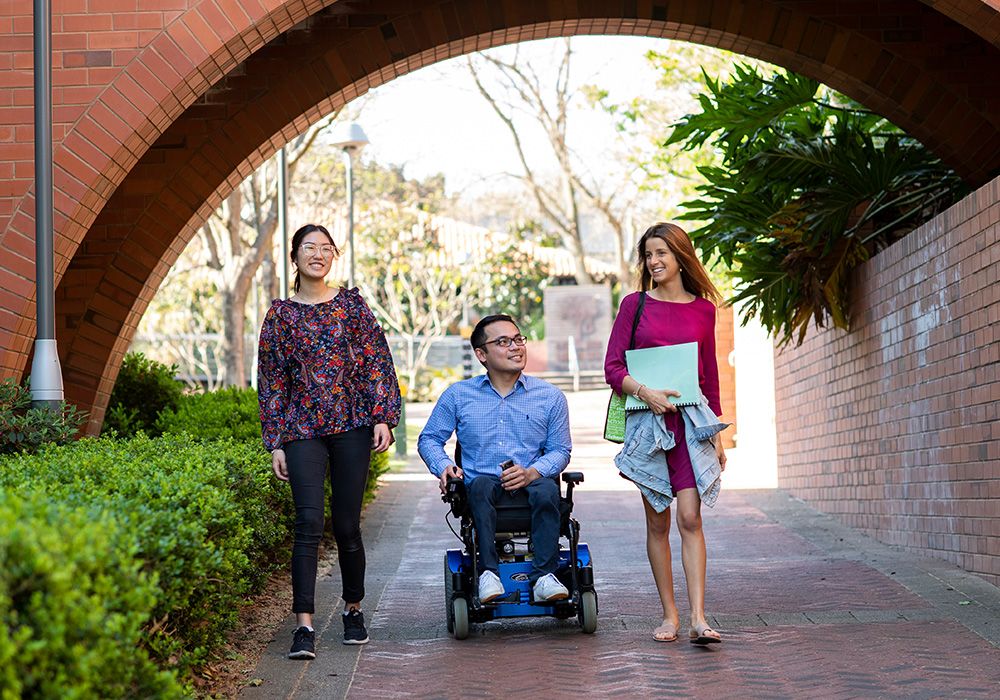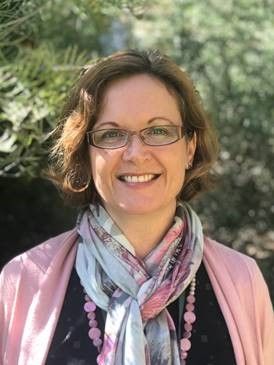Abilities Collective @ Curtin: A conversation with Erica Schurmann
30/11/21. Questions by Luisa Mitchell.

Curtin staff and students on the Perth campus.
Senior Advisor for Diversity and Equity (Disability) at Curtin University, Erica Schurmann is a passionate advocate for improving the access to and quality of services for staff with disabilities.
She recently joined the Abilities Collective @ Curtin, a group of staff members with disabilities, or like Erica, non-disabled people who want to make a positive difference as allies.
Under the leadership of Alana Kelly, the newly formed group is exploring ways that disability inclusion and access at Curtin can be the best it can be, and Erica hopes their new plan will encourage more students and staff with disabilities to be empowered and supported while teaching and learning. Here’s what she had to say on the future of the Abilities Collective @ Curtin.
Note: This is part of a series on stories of disability at Curtin. Stay tuned to hear from more Abilities Collective members!
Hi Erica. Can you tell us a bit about yourself?
I had a lot of involvement with people with disability while growing up, which later influenced my career choice. I completed my undergrad in occupational therapy before moving to the United Kingdom for six years to work in various health, hospital and community services. Returning to Australia, I commenced an injury management role at Curtin in 2002, working in vocational rehabilitation and return to work support for staff injured in their workplace.
Along the way I recognised that Curtin was providing services and support for students with disability to assist them in their studies, but not offering the same to staff. I lobbied for a few years before a position was created in the People and Culture team in 2011, which supported everything from workplace adjustments and job design, to building modifications, parking and accessibility around our Perth campuses. I would organise the provision of electric wheelchairs and scooters, scripting services for IT access (when our systems were inaccessible for staff using screen reading technology), and Job Access – an Australian Government service that removes barriers around employing people with disability.
By this stage I had completed a postgrad in health promotion and continued with a diploma in access consulting. With more lobbying, Curtin included a (voluntary) outcome in its Disability Access and Inclusion Plan (DAIP) in 2012 around employment for people with disability. The Disability Services Commission (now Department of Communities) liked our approach and adopted ‘employment’ as an official seventh outcome to be addressed by all public sector agencies thereafter in their DAIPs.
I took on the role of DAIP coordinator in 2017 in the Ethics Equity and Social Justice team to embed inclusion and accessibility across Curtin’s activities. The focus was, and still is, around facilitating universal design, so our next DAIP will likely work towards embedding universal design in the delivery of all functions across the University. This approach focusses on design that can be accessed, used, convenient and comfortable for everyone, regardless of their ability.
Why did you the join the Abilities Collective and why is this group so necessary?
The need for an employee support network has been recognised for a while, particularly from the perspective of helping Curtin become more disability confident. People have felt more comfortable sharing their equity status anonymously, which is possibly due to fear of being discriminated against in the workplace, and that’s something we wanted to change.
We’ve implemented a lot of Mental Health First Aid training and developed our own disability awareness training, which is available to all staff. For the staff with disability that we already employ, I wanted to establish a network of like-minded peers to share their experiences and build connection and engagement with other colleagues, while generating awareness of disability in the workplace to break down barriers and stigma. It speaks directly to Curtin’s values of respect, integrity and excellence in actively working to create a culture of inclusion.
We wanted Curtin to be an employer of choice for people with disability, but I was also conscious that the Abilities Collective shouldn’t be led by myself – it needed someone who identified as having a disability (the philosophy has always been, “nothing about us, without us”).
So, when Alana Kelly approached me to ask where she could find Curtin’s network, I jumped at the opportunity. We have almost 40 members already since we first put feelers out via our staff news channels to gauge interest in September. We’re officially launching the Abilities Collective @ Curtin next month, as part of International Day of People with Disability.
What do you hope the new Disability Access and Inclusion Plan will include?
Curtin has come a long way and achieved some great things, but there’s always room for improvement. Ultimately, I hope lots of people will participate in the community consultation processes during our DAIP review, so our next plan appropriately reflects and targets the priorities and needs of our community. I hope people will be encouraged to come to Curtin for either work or to undertake studies, because we offer really accessible and inclusive opportunities for people to engage with as part of their professional development.
Any final tips for non-disabled people who want to be an ally?
Spend some time educating yourself. It’s not someone else’s job to teach you about their experiences living with a disability – and that would only be their experience, not necessarily anyone else’s. There are loads of amazing resources available to help employers support people with disability, including the Australian Network on Disability and Job Access.
Don’t make assumptions or allow personal biases to prevent someone participating in work, study or any other activity, simply because you can’t envisage how they might do something. Get to know them and be curious and compassionate when building relationships in the workplace. I think if we all just asked the question, “what support do they need to be productive and effective in the workplace?”, this approach would work regardless of anyone’s circumstances. Make sure there is opportunity for their voice to be heard at the decision-making table, and finally, speak up and show your support.

Erica Schurmann.
___
Explore more information featured in this article

Support Curtin
Curtin is a community of change makers – from our students and staff, to our graduates and supporters. Their generosity means something truly special to us. Together with our friends, we can shape a better future for tomorrow through the actions and choices we make today.

Our Community
Our community traverses oceans. It comprises of graduates from over 160 countries around the world, current and former staff, donors, and supporters – our friends. No matter your relationship to Curtin, we welcome you with open arms and are excited to explore opportunities with you.

